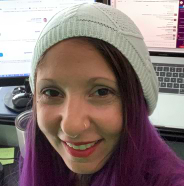Transformers ‘21: Melissa McKay, Developer Advocate, JFrog
As we continue our series on JFrog “transformers” in honor of International Programmers Day, today we meet Melissa McKay, a Developer Advocate on the JFrog Developer Relations team. Melissa’s career has taken her from writing code to presenting her tips and techniques to other developers all over the world. A true transformer, she wears many hats – mom, Java Champion, Docker Captain, co-author of the upcoming book DevOps Tools for Java Developers, UNconference disorganizer, and total tech enthusiast. Read on to find out how Melissa got started in tech and what advice she has for the next generation of coders.
What inspired you to start a career in tech?
It was by pure happenstance that I got started in tech when I was in college. My first computer was a used Macintosh my mom had brought home. I used it to type school papers in high school. I remember there wasn’t much else on that machine except a game of Towers of Hanoi. My grandfather did some research at Sam’s Club and came home with a Windows 95 desktop PC as a high school graduation gift. I had some experience with word processing software at the IBM and Apple labs at school, but little else. At the time, the most useful thing I could do was type — I’m sincerely grateful for that high school keyboarding class! I’m also grateful for those AOL trial CDs that were available at the time because that was my only exposure to the internet — when I could get away with occupying our only phone line with my 56k modem. I started by majoring in electrical engineering my first year of college, but I got hooked on computers and changed my major to computer science after taking a prerequisite course, Intro to Programming, and having one of the best professors (the first one in a series of amazing professors) that pushed all of us to work smarter. C++ was my first coding language and I’ve had experience throughout my career developing desktop applications, and web sites and services in various languages including PHP, Javascript, Ruby, Python, Java, .NET, and Go. This breadth of experience was in part due to an internship opportunity with a programming services company that hired me after graduation. That real-life experience alongside the formal education set me up with a strong foundation.
Like many students, I hit pause on my education after two years and started raising a family. It took me 10 years to go back to school, during which time I used the skills I had to develop and manage various web services. When I returned to finish my degree and continue my career in tech, I was introduced to Java, which became my primary language. There is no wrong or right way to get into tech, and I share my own experience because so many get discouraged and quit over what seem like overwhelming obstacles. After twenty plus years of software and engineering experience, my current position as a Developer Advocate with JFrog gives me unique opportunities to offer encouragement and share what’s possible. Once you begin your tech career, it is guaranteed you will never stop learning. Always look for opportunities for training and to enhance your skills, but more importantly, find an avenue to share that knowledge. And if you feel you’ve hit a place where you are no longer in a position to learn and to teach, it’s time to push yourself and move forward!
What advice would you offer to those considering a career as a developer?
The hashtag #sharingiscaring is something we see in tech community tweets, but it is solid advice that I firmly believe in. From brown bag lunches with peers, to user group meetups, to conferences, the more you share your knowledge with others, the stronger you become as a developer. Showing others how you solved a problem or created code that enhances your productivity or workflow helps open the door to collaboration and to more knowledge sharing. It also has an added bonus of improving your communication skills. I know that I benefit from seeing how someone got from point A to point B to solve a problem, and being able to help others do the same is rewarding.
I think one of the biggest misconceptions is that a junior developer can’t possibly share anything with a senior developer that they don’t already know how to do. This is the farthest thing from the truth and I’m reminded of this every time I learn something new from my own children. We can all find ways to improve ourselves from seeing new ways of doing something or refreshing our own skill set, so being able to give and receive feedback at any level is of utmost importance. Developing your listening skills, exercising your ability to view problems from different perspectives, and improving your coding or presentation through collaboration will serve you well in the long run. You’ll be seen, you’ll open yourself up for new projects or potential promotions, and you will be making a name for yourself as a resource, a team player, as well as a go-getter – someone who wants to do more and keep improving.
Want to learn more about the DevOps toolkit or hone your current skills? Visit JFrog Academy and browse our course catalog. If you’re ready to join these Frogs and many more in their mission to transform the way we work and live, visit the JFrog careers page.






